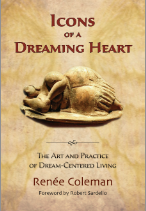The other day, while brooding over how to bring practitioners to the kind of listening that is necessary for hearing through the action of dreaming, I reiterated to a dream group just how important it is to resist thinking about what images mean, or might mean, when we hear a dream.
“Well, what do you think about then?” one of the dreamers asked.
“Nothing,” I answered. “I think of nothing.” And we want to think of nothing. For this is the same ‘nothing,’ I imagine, that teachers of meditation instruct us to think of when we place our attention on what’s called the ‘third eye,’ that space between our eyebrows. If we try to think of nothing, however, we quickly discover that ‘nothing’ immediately becomes a kind of content. What teachers of meditation are asking, therefore, when they tell us to think of nothing, is that we empty ourselves of all thought. But if you’ve ever tried to empty yourself of all thought you will know just how very difficult this is to accomplish.
Instead of ‘nothing’ what we’re after then is a kind of resistance to thought. We gently but quite actively use our subtle will forces to hold off thinking ‘about’ things. If we try to do this without focusing our attention ‘on’ something, we soon find that it is almost impossible. So we want to apply our subtle will forces to keep other associative images, other thoughts and ideas, from entering the space that we’re endeavoring to hold for the sake of the dream. As we listen in a turned out sort of way to the dream images, and if we allow the dream images to move according to their own nature, we soon discover that as dream images penetrate our listening they step into the space that we’re endeavoring to hold open and empty for them. The dream images therefore step through the threshold of our held-off associative attention and into imaginal being.
When the dream images have stepped into imaginal being so that we, as dreamtenders, can be present to them directly, then the dreamtime presences, that is, those spiritual presences that are behind the dream images, begin to reveal themselves. Because the dreamtime is a unique meeting place of the soul and spirit realms, as dream images emerge from the realm of soul, the streaming, all around dreaming action of the spiritual realm is revealed to us. This is why the action of dreaming is not to be confused with the details of the dream. From this perspective, dream details are only important because they carry the action of the dream.
Folks are often quite shocked to discover that the details of a dream don’t much matter, that is, in and of themselves. They are important only because without the dream details we would not be able to sense the action of dreaming. ‘Action’ here means what the dream is doing. What is the dream doing?
Sometimes we can get a feel for what the dream is doing without being able to remember even a single ‘pictorial’ image. When we wake up on the ‘wrong side of the bed,’ for example. More usually, however, we get a feel for what the dream is doing through the details. But if we focus too intently on the images we’ll miss the action. On the other hand, there is no way to focus on the action in a direct way without the details unless, as mentioned, it comes as a kind of ‘mood.’
So we want to develop capacities for listening in a focus/diffused way. We want to listen to and through the dream images as they present themselves so that we might be brought uniquely into the streaming, dreaming action of the spiritual realms. We might say then that we keep one ear out for details of the dream and the other ear out for the action of dreaming but this is not meant in a literal sort of way.
I’m not entirely sure why the dreamtime presences don’t just reveal themselves to us directly, that is, from the get go. My good guess is that it has something to do with trust. Over and over again I find myself returning to a phrase that is attributed to Heraclitus, the pre-Socratic Greek philosopher. Written in ancient Greek as: Φύσις κρύπτεσθαι φιλεῖ, it is most often translated as Nature loves to hide or Nature loves to conceal Herself.
But the word ‘Nature,’ as it’s used in this phrase by Heraclitus, is closer to the Greek word ‘physis.’ Physis, from which we get the words ‘physics’ and ‘physical,’ originally meant ‘a process of a-rising’; or ‘rising up’; ‘emerging every moment from the hidden.’ Nature, therefore, is one way that the a-rising, emerging realm is made present to us. The dreamtime is another.
Homer and other early Greeks (including Heraclitus in other fragments attributed to him) used the word ‘nature’ to suggest the character or nature of a thing, especially a human being. This sense of the word has remained in English when we capitalize Nature in order to distinguish it from, say, human nature.
What is commonly translated as ‘loves’ in this same phrase is not some anthropomorphic desire on the part of Nature. Nor is it the intent to conceal something. Rather ‘loves,’ as it was commonly used during Homer’s time, suggests a friend, or companion. Thus the phrase accredited to Heraclitus might better be translated as: the natural companion to the process of a-rising, or rising up, is concealment.
So how does this apply to dreams? Well, if we consider that the natural companion to the process of a-rising is concealment, then perhaps can take the words of Heraclitus as a kind of invitation. As we notice the a-rising images of dreams we can learn to keep a sideways eye out for what these same images conceal. Not for meaning, or ‘latent content,’ as our old friend Freud suggests, but rather for the hidden, companioning presences of the dreamtime.




0 Comments